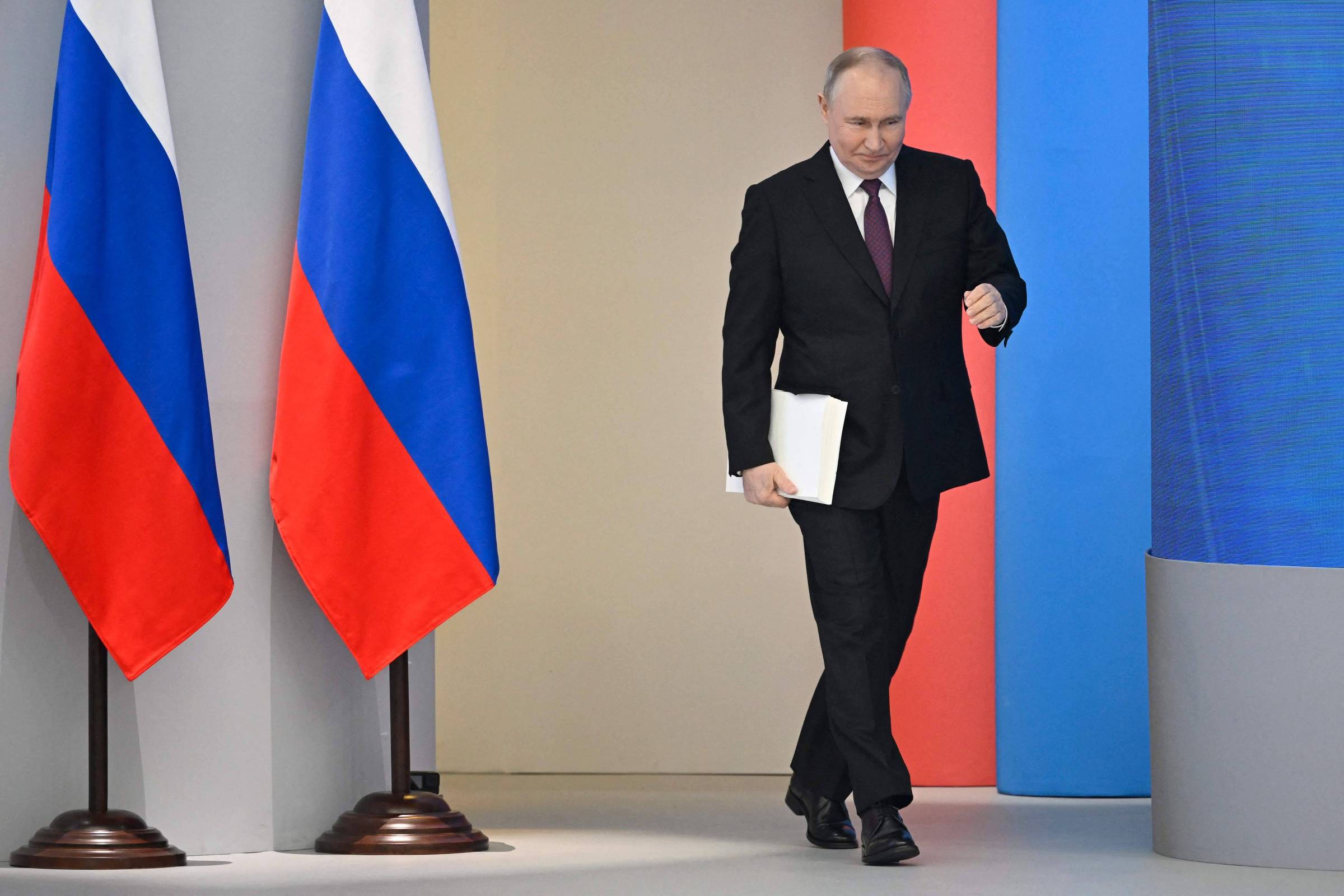Russian President Vladimir Putin accused the West on Thursday (29) of risking a nuclear war that will “destroy civilization” by proposing to send soldiers from the NATO military alliance to Ukraine.
The leader also said the West wants to “repeat the trick that succeeded with the Soviet Union in the 1980s” by “trying to drag us into an arms race.” “We need to allocate resources as rationally as possible to build an effective economy for our armed forces,” he said.
Putin's remarks came during his annual speech to the Federal Assembly (Congress), as required by the Russian constitution, at a convention center in central Moscow. At 127 minutes, it was the longest of the 19 he has spoken since 2000 the previous record was 115 minutes in 2018.
With the presidential election less than a month away, the speech is something of a summary of his campaign themes. So, in addition to broad discussions about opponents, a large part of the speech was devoted to domestic policy issues: incentives to increase birth rates, economic data, programs to reduce alcoholism, artificial intelligence, improvements for small businesses, tourism, environmental and infrastructure projects.
Putin may be reelected, but the Kremlin believes good votes and turnout are essential to legitimizing his power. “We are a family,” he said at the end.
The theme that permeated the speech was the war in Ukraine, which Putin started two years ago, and the confrontation with the United States and its allies. It is something that resonates with voters: according to a poll published on the 20th by the independent Centro Levada institute, fear of war with the West is greatest for 55% of Russians.
“We remember the fate of everyone who sent contingents to our country,” he said, referring to the French and German invasions in the past. “Now the consequences for potential interveners are much more tragic. They must finally understand, and I just told them, that we also have weapons that can destroy targets in their territories.”
It was a private message to French President Emmanuel Macron, who raised the idea of helping Ukraine not only with weapons, but also with armed forces. “Don't they understand that there is a risk of nuclear conflict?” he said.
The proposal was rejected by European colleagues over concerns about Russia's stance Putin's spokesman Dmitry Peskov had already spoken of the “inevitability” of war with NATO if it came to that.
The reference to the arms race that contributed to the collapse of the Soviet Union refers to Putin's historic obsession with making Russia a world power again. In fact, the country entered a war economy rhythm after its neighbor invaded, and today a third of its free federal investment goes to defense. Military spending was 4% of GDP in 2023 and could reach 7% this year.
The Russian took advantage of the good moment on the field of war when another city in the east fell into his hands this Thursday. “We have the initiative and are going on the offensive. We did not start this war, but we will do everything to end it and eradicate Nazism,” he said, repeating the mantra of his invasion.
“We have gained great combat experience. We know we still have problems, but at the same time we know what needs to be done,” he said, observing a minute's silence for “the fallen heroes” who defend the interests of “the people” of Donbass (eastern Ukraine) and New Zealand. Russia (south of the country)”, areas that are currently partially under the control of the Kremlin.
He also celebrated the tenth anniversary of what he called the Russian Spring, the annexation of Crimea and the start of the civil war in eastern Ukraine. While he boasted of advanced nuclear capabilities, he said the “doomsday torpedo” Poseidon was almost ready for use.
It confirmed that in addition to the ballistic missile fired by Kinjal fighters, Russia used another of its “invincible weapons” announced in Ukraine in 2018, the also hypersonic Tsirkon.
Putin began speaking at 12:15 p.m. (6:15 a.m. in Brasília). The event is always eagerly awaited: last year it ended with the announcement of Russia's withdrawal from the last current nuclear arms control treaty. This was the leader's 19th speech in the Kremlin since late 1999 and was heard not only by parliamentarians but also ministers, military leaders, civil society leaders and even Orthodox Patriarch Cyril, an ally of the president.
The president reiterated his worldview that the Brics, a bloc that includes Brazil, will be crucial to rebuilding the international order. “In 2028, the Brics countries with their new members will be responsible for 72% of global GDP,” he said.
He defended the end of the dollar as the standard for global negotiations due to its political use by the United States, a position shared by the Brazilian government. “The West has discredited its currencies with the sanctions regime imposed because of the war against Russia, which has so far failed to paralyze the country.”
Predictably, there has been no word yet about internal disagreements or the prison death of activist Alexei Navalni, which occurred two weeks ago. The opponent would be buried this Thursday, but his allies said they could not find anyone to take on the task because of Putin's speech the ceremony would then take place this Friday (1st).

